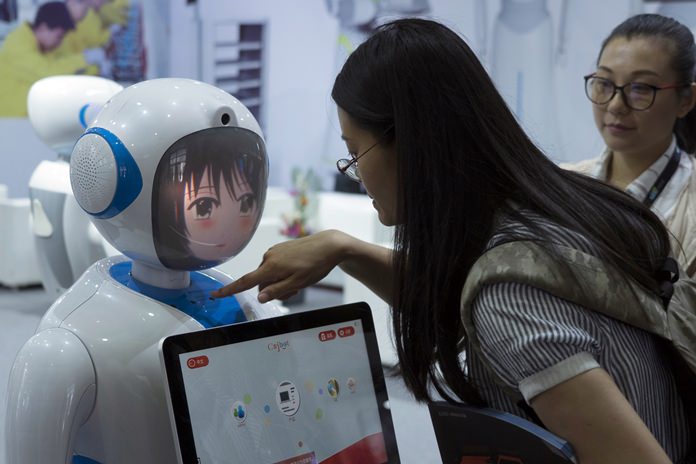
Beijing (AP) – China fired back Saturday in a spiraling trade dispute with President Donald Trump by raising import duties on a $34 billion list of American goods including soybeans, electric cars and whiskey.
The government said it was responding in “equal scale” to Trump’s tariff hike on Chinese goods in a conflict over Beijing’s trade surplus and technology policy that companies worry could quickly escalate and chill global economic growth.
China “doesn’t want a trade war” but has to “fight back strongly,” said a Commerce Ministry statement. It said Beijing also was scrapping agreements to narrow its multibillion-dollar trade surplus with the United States by purchasing more American farm goods, natural gas and other products.
The United States and China have the world’s biggest trading relationship but official ties are increasingly strained over complaints Beijing’s industry development tactics violate its free-trade pledges and hurt American companies. Europe, Japan and other trading partners raise similar complaints, but Trump has been unusually direct about challenging Beijing and threatening to disrupt such a large volume of exports.
“In this trade war, it’s the U.S. who is playing the role of provocateur, while China plays defense,” said the Global Times, a newspaper published by the ruling Communist Party. “China is a powerful guardian and has enough ammunition to defend existing trade rules and fairness.”
Beijing will impose an additional 25 percent tariff starting July 6 on 545 products from the United States including soybeans, electric cars, orange juice, whiskey, lobsters, salmon and cigars, according to the Ministry of Finance.
Most are food and other farm goods, hitting Trump’s rural supporters hardest.
Beijing appeared to be trying to minimize the impact on its own economy by picking U.S. products that can be replaced by imports from other suppliers such as Brazil or Australia.
Chinese regulators also are considering a tariff hike on an additional 114 products including medical equipment and energy products, the Finance Ministry said. It said a decision would be announced later.
That mirrored the Trump administration’s announcement Friday of a tariff hike on $34 billion of Chinese goods, also due to take effect July 6, and plans to consider widening it to an additional $16 billion of other products.
China’s heavily regulated economy also gives the ruling Communist Party additional options for retaliation by withholding approval for business activity.
Anti-monopoly regulators are believed to have delayed announcing a decision on U.S. tech giant Qualcomm’s proposed acquisition of semiconductor maker NXP in part due to the tariff conflict. Other companies say the approval process for licenses has slowed down.
“China’s retaliation will remain calibrated and largely reciprocal, with President Xi Jinping ready to counter any move by Trump,” said Eurasia Group in a report. “Beijing has a freer hand for informal retaliation, which will now start to increase.”
The American Chamber of Commerce had appealed to Washington to avoid a tariff hike but said Trump’s threat has prompted Beijing to engage in more intensive negotiations than it had in recent years.
Companies also are watching the fate of ZTE Corp., a Chinese maker of telecoms gear that ran afoul of U.S. regulators after it violated restrictions on exports of American technology to Iran and North Korea.
Washington rescinded a ban on sales of U.S. technology to ZTE after the company agreed to pay a $1 billion fine and hire American-picked compliance managers. The agreement allows Washington to impose an additional $400 million fine or other penalties if ZTE violates the deal.
Trump is pressing Beijing to narrow its trade surplus with the United States and roll back its plans for state-led development of Chinese global competitors in technology fields including electric cars, renewable energy, artificial intelligence and biotech.
The U.S., Europe, Japan and other trading partners complain Beijing’s tactics include outright theft of foreign technology and subsidies and protection from competition for fledgling Chinese industries. They say those violate Chinese market-opening commitments under the World Trade Organization.
Tensions eased temporarily after Chinese negotiators agreed at talks in Washington in May to buy more American farm goods, natural gas and other products. American officials said they would suspend threatened tariff increases on up to $150 billion of Chinese goods.
The dispute revived after the White House renewed its plan for a tariff hike on $50 billion of Chinese goods as part of the technology dispute. The Chinese government warned after another round of talks June 3 that it would discard those deals if the tariffs went ahead.
Businesspeople and economists say Chinese leaders are less likely to compromise on technology. They view plans for state-led development of companies capable of competing globally in fields including electric cars, renewable energy and biotech as a route to prosperity and to restore China to its rightful role as a world leader.
“There isn’t one country who would give up their rights to advance technology and make industrial upgrades,” said the Global Times editorial.
Beijing also has announced plans to cut import duties on autos and some consumer goods and to ease limits on foreign ownership in auto manufacturing, insurance and some other industries, though those don’t directly address U.S. complaints.
On Thursday, a Commerce Ministry spokesman said some exporters were rushing to fill orders due to concern trade conditions might change, but said they were “not the mainstream.”
Online:
Ministry of Finance of China (in Chinese): http://gss.mof.gov.cn
 |
 |





